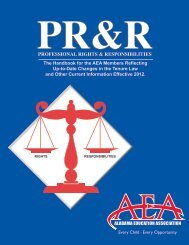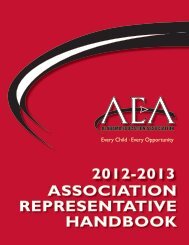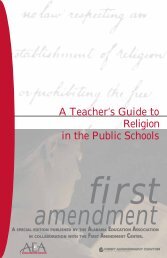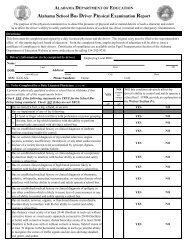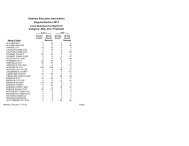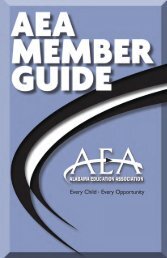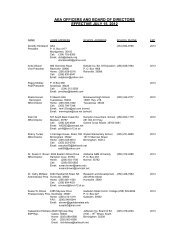2012 ESP Handbook - Alabama Education Association
2012 ESP Handbook - Alabama Education Association
2012 ESP Handbook - Alabama Education Association
You also want an ePaper? Increase the reach of your titles
YUMPU automatically turns print PDFs into web optimized ePapers that Google loves.
Trades, Crafts, Machine Operators<br />
• Electricians – Must hold a state license (34-36-2, -3,<br />
-7-9).<br />
• Plumbers – Although typically plumbers should be<br />
licensed, there is exclusion for maintenance workers<br />
who do plumbing-related work in the normal course<br />
of their duties (34-37-6; 34-37-15). Maintenance<br />
workers and plumbers (unless such plumbers wish<br />
to do plumbing work outside their employment in<br />
public schools) would not need to hold a license.<br />
Transportation, Delivery, Vehicle Mechanics<br />
• School Bus Drivers – Must hold a special school bus<br />
driver’s license, which must be renewed each year. In<br />
order to have the license renewed, driver must take<br />
four hours of continuing training developed by the<br />
Department of <strong>Education</strong> (16-274).<br />
• Vehicle Mechanics – Must take training developed by<br />
the Department of <strong>Education</strong> (16-27-5).<br />
Federal Statutes<br />
Federal statutes typically do not mandate credentialing<br />
requirements – they mandate money. Frequently, a<br />
state that wants federal monies must meet or exceed<br />
the standards imposed by federal statutes.<br />
The mandates for personnel within federal regulations<br />
are mainly the training requirements found in the<br />
Toxic Substances Control Acts for the abatement of<br />
asbestos, lead, and radon. Standards for public school<br />
bus drivers are clearly outlined.<br />
• Instructional Paraprofessional – A local school<br />
district that receives federal funds to employ<br />
instructional paraprofessionals must ensure that<br />
the paraprofessionals have the necessary skills and<br />
knowledge to assist participating children in meeting<br />
the section’s educational goals, have a high school<br />
diploma or its equivalent (exception for those who<br />
have a proficiency in language other than English<br />
that is needed to enhance the participation of<br />
children in programs under this part), and are<br />
under the direct supervision of a teacher.<br />
9<br />
Under No Child Left Behind, all new<br />
instructional paraprofessionals working in<br />
a program supported by Title I, including<br />
schoolwide programs, must have two years,<br />
at least 48 semester hours, of postsecondary<br />
education, or be a high school graduate who<br />
can demonstrate on a “formal state or local<br />
academic assessment” the skills necessary to assist<br />
in classroom instruction of reading, writing, and<br />
math. The formal state assessment is WorkKeys<br />
which may be a “paper and pencil” test or a test<br />
taken on a computer. A score of three must<br />
be made on each section of the WorkKeys to<br />
meet the requirements under NCLB. Existing<br />
instructional paraprofessionals must have met this<br />
requirement by the end of the 2005-06 school<br />
year.<br />
• Physical Therapy Assistant – Must be registered by<br />
providing evidence of having graduated from a<br />
physical therapist’s assistant program approved by<br />
the board (33-35-101, 102, 105, 107).<br />
• Audiology or Speech Pathology Aide – Must meet<br />
minimum qualifications established by the board and<br />
work under the direct supervision of the respective<br />
licensed professional (33-33-103).<br />
• Electrician and Plumber – Must be licensed but it<br />
appears that individuals doing minor electrical work<br />
may be exempt (15-1-119).<br />
• School Bus Driver – Must have a commercial driver’s<br />
license with a school bus “s” endorsement which<br />
requires both a written and driving test. Driver must<br />
have annual training of not less than six hours (16-<br />
27-4).<br />
• Interpreter/Transliterator – Must hold a license<br />
or a permit. This can be obtained by passing a<br />
code of ethics test and taking a performance test as<br />
outlined by the <strong>Alabama</strong> Board of Interpreters and<br />
Transliterators. They must also have 20 hours of<br />
continuing education. The license/permit must be<br />
renewed annually.<br />
Aides that perform only clerical, personal care,<br />
or playground duties are not considered to be<br />
instructional paraprofessionals and do not have to<br />
meet the NCLB standards.



